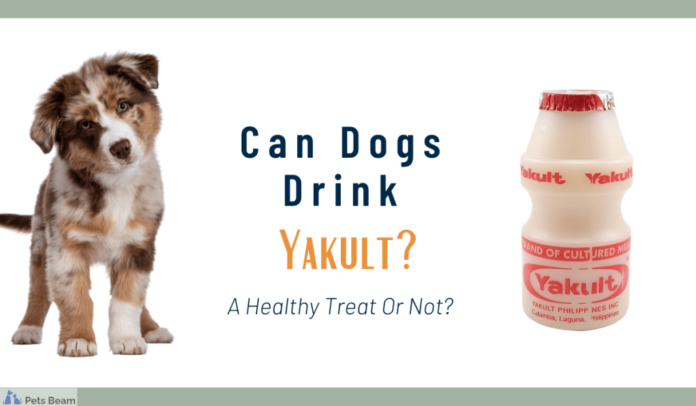The Quick Answer
Yes, dogs can technically drink Yakult, but it’s not the best probiotic option for your four-legged buddy. While it’s not toxic, there are some important things you should know before sharing this popular probiotic drink with your pup.
What’s Actually in Yakult?
Yakult is a sweet, probiotic dairy drink that contains:- Lactobacillus casei Shirota strain (the good bacteria)- Skimmed milk- Sugar- Glucose-fructose syrup- Natural flavors- Water
Why You Might Wanna Think Twice
1. Sugar Content is a Big No-No
Let’s be real – Yakult’s got way too much sugar for your doggo. One tiny 65ml bottle contains about 11.4g of sugar! That’s like giving your pup a bunch of candy, and we all know that ain’t good.
2. Lactose Issues
Most adult doggos are actually lactose intolerant (yeah surprising right?). While Yakult uses skimmed milk, it still contains lactose that could make your fur baby’s tummy upset.
3. Small Serving Size
Like, seriously – have you seen how tiny those Yakult bottles are? Your dog would need multiple bottles to get any real probiotic benefits, and that means even more sugar overload!
What Could Happen if Your Dog Drinks Yakult
If your pup sneaks a bottle don’t panic! But watch out for these symptoms – Diarrhea- Gassy tummy- Vomiting- Bloating- General discomfort
Better Alternatives for Your Doggy’s Gut Health
Instead of Yakult, try these dog-friendly probiotic options
-
Specialized Dog Probiotics
- Made specifically for canine digestive systems
- No added sugars
- Proper dosage for dogs
- Available in powder or chewable forms
-
Plain Yogurt
- Small amounts of unsweetened, plain yogurt
- Natural probiotics
- Less processed than Yakult
-
Kefir
- Plain, unsweetened variety
- Rich in beneficial bacteria
- Better tolerated than regular dairy
When Your Dog Actually Needs Probiotics
Your furry friend might benefit from probiotics if they’re dealing with:- Recent antibiotic treatment- Digestive issues- Diarrhea- Stress-related tummy problems- Recovery from illness
How to Safely Introduce Probiotics to Your Dog’s Diet
-
Start Small
- Begin with tiny amounts
- Watch for any reactions
- Gradually increase if tolerated well
-
Consult Your Vet
- Get professional advice
- Discuss specific probiotic needs
- Monitor progress
-
Be Consistent
- Regular schedule
- Same time each day
- Track improvements
The Bottom Line
While Yakult isn’t gonna poison your pup, it’s defo not the best choice for their probiotic needs. The high sugar content and potential lactose issues make it a less-than-ideal option. Instead, stick to probiotics specifically made for dogs or natural alternatives like plain yogurt.
FAQs About Dogs and Probiotics
Can puppies have Yakult?
Nope, puppies have even more sensitive tummies than adult dogs. Stick to puppy-specific probiotics recommended by your vet.
What if my dog accidentally drank a whole bottle of Yakult?
Don’t freak out! One bottle probably won’t cause serious harm, but keep an eye on your pup for any digestive issues over the next 24 hours.
How often should I give my dog probiotics?
Daily supplementation is usually fine, but always follow the dosage instructions on dog-specific products or your vet’s advice.
Can probiotics make my dog sick?
While rare, some dogs might experience temporary digestive upset when starting probiotics. That’s why it’s important to start slow and monitor their reaction.
Tips for Choosing Dog Probiotics
-
Check the Label
- Look for dog-specific strains
- Avoid artificial sweeteners
- Check expiration dates
-
Storage Matters
- Follow storage instructions
- Keep in cool, dry place
- Don’t use expired products
-
Quality Counts
- Choose reputable brands
- Look for quality guarantees
- Read reviews from other pet parents
Signs Your Dog’s Probiotics are Working
Watch for these positive changes:- Firmer stools- Less gas- Better appetite- Improved energy- Healthier coat- Regular bowel movements
When to Stop Giving Probiotics
Consider discontinuing if you notice:- Adverse reactions- No improvements after 4-6 weeks- Digestive issues getting worse- Your vet recommends stopping
Remember, every dog is different, and what works for one might not work for another. Always pay attention to your furry friend’s individual needs and responses to any new supplements or treats.
Final Thoughts
While sharing Yakult with your pup might seem like a nice idea, there are way better options out there for supporting their gut health. Stick to pet-specific probiotics or natural alternatives, and always chat with your vet before making any major changes to your dog’s diet.
Keep it simple, keep it safe, and your furry friend’s tummy will thank you!












